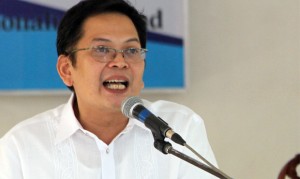New chief says customs valuation system needs fixing
MANILA, Philippines—The valuation of an undisclosed number of importations handled by the Bureau of Customs was “a little bit low,” resulting in lower revenue collections under the Aquino administration.
Newly appointed Customs Commissioner John Phillip Sevilla made this disclosure in a recent interview with the Inquirer in which he cited some “quick checks” he made of the bureau’s records.
His initial findings were that the bureau’s import valuation data were “not systematically organized” and that the 17 Customs collection districts nationwide “do not have a uniform import valuation reference.”
Worse, he said, the bureau’s accreditation, operations and audit groups have not been sharing data, adversely affecting their respective mandates.
“I really don’t know why,” said the former finance undersecretary who replaced Ruffy Biazon as customs chief in early December. The former Muntinlupa City legislator quit his post after being linked to the pork barrel scam.
According to Sevilla, “right now I’m seeing little details,” which he said were the things that needed immediate attention. “We will succeed or fail based on these little details. It’s the sum of small things rather than the big things,” he said
The BOC chief said they were “trying to develop “alternative sources of data for the valuation of principal imports,” but acknowledged it “won’t happen overnight.”
“Based on the conversations I’ve had… the bureau’s valuations data are not systematically organized. It seems if there are valuation-related disputes, every port does its own thing,” he said, adding he was “not comfortable with the process.”
“The whole country should have a single (import valuation) reference,” he added. “When you have a valuation issue, there should be a value that applies to the whole country, not per collection district. So I’m trying to understand the whole thing…. What is the information that’s available? Can we organize it better so that we can make it available systematically to everybody?”
“The general practice is, unless you have a very strong basis to disagree with the declared value (of an imported item), the declared value is the basis for the duties and taxes paid,” he said. “If there are different valuations at the level of appraisers at different ports, if each one would look at comparative data, then that’s a very inefficient way to do it.”
“That is why, it should be systematic,” he added. “The more inefficient your processes are, the more prone they would be to corruption.”
Referring to some recent import valuations by Customs frontline staff, Sevilla said “the numbers I’m seeing are a bit low.”
“If we systematize and then we update everything, the valuation process would improve over time,” he said. “That’s one thing that I think could definitely make an impact on our collections in 2014.”
This year, the Bureau of Customs has a revenue collection target of P408 billion, which some agency officials found too high and unrealistic.
Sevilla believes they should work hard to meet the agency’s revenue goal. “It is not the bureau which sets these targets. But it’s our job to meet the target regardless of what we think about it,” he said.
He admitted the bureau was unlikely to meet its 2013 collection target of P340 billion.
As of mid-December, the bureau’s collections were “somewhere between 5 percent and 6 percent below the target for the month of December (P27.99 billion).”
January to November collections totaled P280.74 billion, which is P31.26 billion short of the bureau’s revenue goal of P312 billion for the 11-month period.
Related stories
New customs chief says courts partly to blame for rice smuggling

